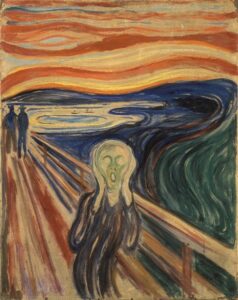Wise Understanding of Emotion

Wise Understanding of Emotion
One of the salient qualities of inner peace is equanimity, defined as the ability to maintain mental and emotional balance in the midst of whatever is happening. For human beings, emotional turbulence is a major source of challenge. Emotional balance, like walking a tightrope, requires both skill and practice. It rests on a foundation of wise and compassionate understanding of emotional life.
- Make explicit your intentions, aspirations, and goals in regard to your emotional life. The main intention is to be with the experience of being upset. Other possible examples: to learn to sustain your experience of being centered (physical balance is a great analogue of this skill); to deepen your understanding of some particular emotional state — (e.g., the experience of being disappointed.)
- The most basic observation is, “being emotionally upset is like this.” * Then, inquire deeply about what you are feeling; what it is connected to; what is beneath that.
- Bring mindful awareness to the somatic experience of emotional activation and have the intention to relax into the experience. Emotion lives in the body. We process experience through the very act of bringing conscious awareness to it.
- Notice how you are relating to the experience of being upset. The goal is to not hold onto experience, push it away, or escape from it, but rather to simply be with, open to, and receive it.
- The primary goal in relating to emotional experience is for feelings to be felt more completely so that release and letting go can happen. Mindful awareness of emotional experience is key, but at the same time it should be understood that letting go is not something that happens all at once. It occurs in stages through a process called “working through.”
- It may not be skillful to just name emotions if in so doing you relate to your emotions like symptoms of a disease you are trying to cure or problem you are trying to get rid of. The frame in which you hold emotional experience is important!
- Emotional reactivity is grounded in our interpersonal (relational) matrix of connection. It is not possible to deeply understand Self without also understanding Other. Psychological understanding of the dynamics between us is also very helpful.
- “Inquiring Deeply” about your emotional experience means to consciously engage your experience (on and off the cushion) with the attitude of delving into it, feeling whatever it is more fully and inviting it to reveal itself. More than simply mindfulness of the moment, deep inquiry explores the meanings and messages conveyed by your emotional experience.
Ultimately, emotional equanimity is about “going with the flow” of experience. It rests on the broad foundation of our ways of being; what we may call our “life balance”. Thus, at the psychophysiological level, for example, equanimity reflects our capacity to relax and rest; the balance between being active and being receptive. At the interpersonal level, it rests on the balance between being with others and being alone, plus our ability to be in harmony with others. And finally, at an existential level, equanimity is related to our energetic state. This includes the way we animate ourselves, our pace of life, and our capacity to be centered and present with What Is.
Practice finding mental and emotional balance in the midst of whatever is happening– perhaps especially when things are other than we wish them to be. This maximizes our ability to find the wisdom and compassion that is available in every moment.
* This is a cornerstone of the teachings of Vipassana master Ajahn Sumedho. Sumedho, A. (2007) The Sound of Silence. Wisdom Publications, Boston, MA
![]()
